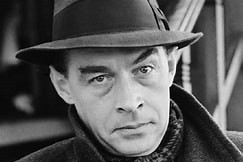
posted 10th June 2023
Erich Maria Remarque was born in Germany in the summer of 1898 into a working-class Catholic family. Remarque’s life changed forever when war broke out in Europe in late summer 1914. The young Erich was too young to be conscripted into the German army when the war started but by the middle of 1917, he’d been called up to fight. After his basic training he was sent to the Western Front and fought on the front line. Remarque was badly wounded by shrapnel which ripped into his arm, leg and neck and he was evacuated from the battlefield and sent to military hospital in France. In October 1918 he was recalled to the German army, but the war was going badly for Germany. On the 11th of November the war ended. Germany and Remarque had lost the war.
Remarque returned to Germany a soldier from the losing side. His experiences in the conflict made him a strong critic of the idea of war. He began establishing his life again and continued training to become a teacher. The Germany that Remarque was living in after the war was not the same place it had been before. Embittered by defeat, angry at unemployment and humiliated by the Versailles Treaty which placed the blame for the war entirely on German shoulders, the political radicals of left and right were making their presence known. In Munich in 1919 there was a short-lived Communist revolution modelled on the Russian revolution two years earlier that was put down by nationalists returning from the war. Germany was on the bring of collapse. Germany was the unstable country of Europe.
Remarque’s life took another turn for the worse by the death of his mother. Writing was the only salvation for Remarque whose first novel, The Dream Room, was published in 1920. Throughout the 1920’s Remarque wrote numerous works and articles and began to produce a body of impressive prose literature. In late 1928 a German Newspaper published his seminal work, All Quiet on the Western Front. A book of his most famous work was published the next year and became an international bestseller. Remarque’s classic novel, written in narration form, has gone down as one of the most important pieces of literature of the 20th century.
The life of Erich Maria Remarque had taken many turns. The outbreak of WW1 turned him into a soldier, defeat in the war turned him into an anti-war writer, the death of his mother created a hole in his life but the rise to power of another WW1 veteran, Adolf Hitler, turned him into a public pariah. Hitler and the Nazi’s detested the anti-war nature of Remarque’s work. In May, 1933, Nazi Propaganda Minister, Josef Goebbels, declared Remarque’s writings ‘unpatriotic’ and ordered all libraries to remove his work and ban anyone from selling it. Remarque saw the writing on the wall and left Germany to live in his villa in Switzerland. The Nazis continued to attack Remarque even after he’d left the country. In 1938 Remarque had his German citizenship stripped away from him. Just before the outbreak of WW2 Remarque left Europe for the USA.
Remarque spent WW2 in the USA. His sister, Elfriede, had stayed behind with her family in Germany. In 1943 she was arrested for making defeatist comments. After a trial she was executed. Remarque had suffered another tragedy in his fraught life, Remarque didn’t learn of his sister’s death until after the war. After the war Remarque returned to Switzerland and in 1952 published the novel, Spark of Life, set in a fictional concentration camp during WW2. Remarque dedicated the novel to his murdered sister.
Remarque spent the rest of his life in Switzerland. His literary legacy is one rooted in the great disaster of modern European history, WW1. His most famous work, All Quiet on the Western Front, has gone down in artistic history. His legacy has been to document war from the unique perspective of a great war veteran.




